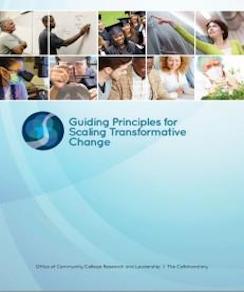The classic idea for scaling innovation calls for replication with fidelity, meaning implementation consistent with an original innovation.[1] In complex organizations such as community colleges where context varies greatly from one college to another, leaders need to pay close attention to the local context to sustain and scale an innovation.
Lisbeth Schorr, a leader in scaling in family and community settings, concurs that for innovations to last, they must strategically adapt to the locations where they are implemented.[2] In her experience, a more promising approach than replication involves practitioners recognizing how the local context influences implementation; using data to understand what is working (and what is not); and repeating the pattern of implementing, measuring, learning, and adapting over time. Her thoughts echo those of John Kotter, the leading organizational change expert who keynoted the 2013 Learning Lab on Transformative Change.[3] According to Kotter, establishing a sense of urgency for change, communicating a vision for change, and integrating change into the local cultural context is important to organizational adaptation and improvement.
What is your experience with adoption and adaptation? What role has local context played in your organization’s adoption and adaptation efforts? What lessons can you share for others who are involved in adoption and adaptation of innovation in the community college context?
This is the fifth post in a series about the Transformative Change Initiative (TCI) and is based on the 2014 TCI booklet. This post discusses the second guiding principle in the TCI Framework.
Debra Bragg, OCCRL director and endowed professor at Illinois, researches the transition to college by youth and adults, especially student populations that have not attended college historically.
[1] Murray, R., Caulier-Grice, J., & Mulligan, G. (2010, March). The open book of social innovation. Washington, DC: Center for American Progress. Retrieved from http://youngfoundation.org/publications/the-open-book-of-social-innovation/
[2] Schorr, L. B. (2012, Fall). Broader evidence for bigger impact. Stanford Social Innovation Review. Retrieved from http://www.ssireview.org/articles/entry/broader_evidence_for_bigger_impact
[3] For more on John Kotter’s work, see http://www.kotterinternational.com/our-principles/changesteps
